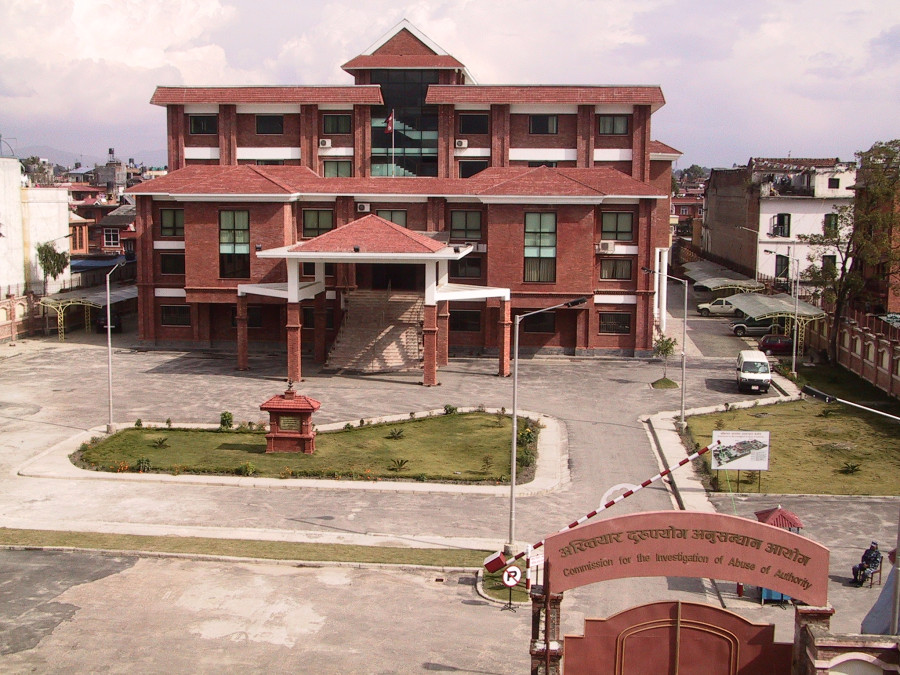National
Failure to indict Poudel and Regmi in land grab could set a dangerous precedent, say legal experts
All of the 175 indicted in the Lalita Niwas scam could argue for equal treatment before the law if they too pledge to return their property like Poudel and Regmi did.
Prithvi Man Shrestha
Legal experts have argued that the Commission for Investigation of Abuse of Authority has weakened its corruption cases against 175 individuals in relation to the Lalita Niwas land grab scam by exempting Nabin Poudel and Kumar Regmi.
Poudel is the son of ruling Nepal Communist Party (NCP) General Secretary Bishnu Poudel and Regmi is a sitting justice at the Supreme Court.
Three former ministers, as many secretaries and several others identified as middlemen face corruption charges for their roles in transferring government land into the names of individuals.
According to the anti-graft agency’s charge sheet, Poudel and Regmi were not indicted because they “agreed to return” the plots of land they had bought. The decision to exempt individuals on such grounds could encourage others also to commit to returning the pieces of land so as to get the clean chit from the court, say legal experts.
“The court cannot treat citizens differently,” said Gauri Bahadur Karki, former chair of the Special Court, which is the first court to look into corruption cases. “Many people who purchased land at Lalita Niwas are now defendants. They too may argue that they will return the land as Poudel and Regmi and the court will have to give them a clean chit.”
Businessmen like Min Bahadur Gurung, owner of Bhatbhateni Department Store, and political figures could evade criminal charges in the same way that Poudel and Regmi did, said Karki. Gurung has been named as one of the middlemen in the land grab.
“What if he also says that he wants to return the land he purchased?” said Karki. “Arguments will definitely be made that if Poudel and Regmi can be exonerated, why not Gurung.”
On February 8, days after the commission’s indictment, plots of land in Poudel and Regmi’s names were quietly returned to the government.
The anti-graft agency’s move to implicate some and spare others has already drawn criticism, as it also exonerated two former prime ministers, Madhav Kumar Nepal and Baburam Bhattarai, on the grounds that the decisions taken by their Cabinets were “policy decisions”. The anti-corruption watchdog has argued that it does not have the jurisdiction to look into the Cabinet’s “policy decisions”.
Legal experts, however, described the anti-corruption body’s definition of “policy decisions” as ludicrous. Advocates that the Post spoke to earlier this week said that the anti-graft agency had ample ground to file cases against the former prime ministers based on a 1996 Supreme Court verdict passed in response to a writ filed by advocate Bal Krishna Neupane.
Neupane on Wednesday filed yet another writ at the Supreme Court against the commission's decision not to prosecute Nepal and Bhattarai as well as the decision to exempt Poudel and Regmi from corruption charges. In his writ, Neupane has argued that the commission has introduced a new principle where a person who returns the property related to a crime can be exempted from criminal prosecution.
“The court needs to arrive at a judicial settlement as to what happens to the corruption case if other defendants in the case also come forward to return the land as Nabin Poudel did,” Neupane has argued.
Legal experts say that the question is not about how those accused of corruption in the Lalita Niwas scam could get away with it by pledging to return the land, but rather, exonerating people on such grounds could defeat the entire effort to root out corruption.
As per Section 3 of the Corruption Prevention Act-2002, a person convicted of corruption is liable to a fine equal to the amount (property) involved in the graft, in addition to the confiscation of the property or amount. Those convicted of corruption worth more than Rs10 million are also liable to face jail terms of eight to ten years.
“So the defendants who have purchased land at Lalita Niwas have more to gain from agreeing to give up their land than face being convicted,” said Karki.
If all the accused start returning the money or property they have amassed through corruption to evade prosecution, the Corruption Prevention Act and all efforts to curb corruption will be invalidated, said legal scholars. Not prosecuting those who agree to return the property related to crimes could emerge as a dangerous precedent, they say.
Karki said that he believes cases were not filed against Poudel and Regmi with the intent to weaken the entire case, paving the way to exonerate several other high-profile defendants.
Many are also questioning why some ruling party leaders have been presenting Nabin Poudel, son of Bishnu Poudel, as a victim of fraud. According to those who are defending Poudel, he bought the land from Shobha Kanta Dhakal, one of the key middlemen in transferring the government land in the name of individuals.
“Why did Poudel or Regmi not file a fraud case with the police against those who sold them the Baluwatar land plots if they had been cheated?” said Om Prakash Aryal, a lawyer and anti-corruption activist. “It looks like the commission itself showed Regmi and Poudel ways to exonerate themselves by agreeing to return the plots.”
Senior advocate Bhimarjun Acharya, who argues that the corruption cases were filed with ill intent, said that the anti-graft agency left a grey area by implicating some and passing over others.
“But I don’t think the court will give a clean chit to other defendants just because they agree to return their land,” said Acharya. “Nonetheless, the defendants will have ample ground to argue why they should not be spared just like Poudel and Regmi on the basis of equal treatment.”




 20.12°C Kathmandu
20.12°C Kathmandu














